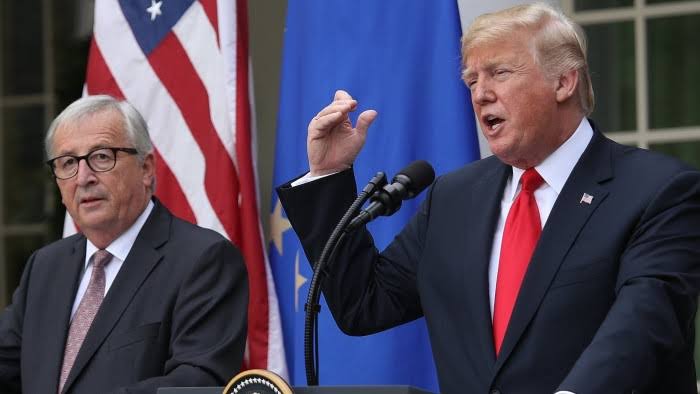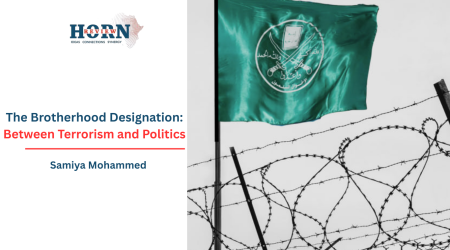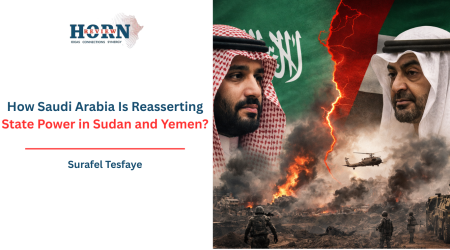
3
Apr
From ‘America First’ to ‘America Alone’: Tariffs, TPLF, and the Armageddon of AGOA
Can AGOA Survive Trump’s Tariffs While Tigray Simmers?
The global political economy thrives on irony. Just as Ethiopia’s garment factories begin to hum with the promise of newfound competitiveness, courtesy of President Trump’s punitive 50% tariffs on Bangladesh and Vietnam, Washington simultaneously brandishes the threat of sanctions against Tigray’s political elite, accused of maneuvering in Eritrea’s latest regional gambit. In this moment of geopolitical realignment, the African Growth and Opportunity Act (AGOA), once heralded as a transformative mechanism for U.S.-Africa trade, lies in a state of functional obsolescence, exposed as a relic of neoliberal optimism. What might be considered poetic justice is, in reality, a crisis of staggering proportions.
Trump’s tariff war reads as a carefully calibrated instrument of economic coercion: Lesotho (50%), Madagascar (47%), Mauritius (40%)—each levy a calculated disruption to industries nurtured under AGOA’s fragile largesse. South Africa, burdened with a 30% tariff, must now confront the reality that its auto exports to the U.S. have been transformed overnight into unaffordable luxuries. Yet, amidst this economic carnage, certain actors emerge as unexpected beneficiaries. Ethiopia, Kenya, and Ghana, saddled with a comparatively modest 10% tariff, suddenly find themselves in possession of strategic advantages in the global textile trade. Ethiopia, in particular, with its vast industrial parks and strikingly low labor costs, is poised to outmaneuver Dhaka and Hanoi, contingent, of course, on its ability to avert political implosion.
And herein lies the paradox. Even as Addis Ababa aspires to cement its position as a global textile hub, the Tigray People’s Liberation Front (TPLF), historically a destabilizing force in Ethiopian politics, stands accused of rekindling strategic ties with Eritrea’s Isaias Afwerki, a leader whose grievances have outlived most contemporary regimes. The United States, in a rare instance of bipartisan coherence, has threatened targeted sanctions against Tigrayan elites, not out of any principled commitment to Ethiopian stability, but rather out of concern that unchecked conflict in the Horn of Africa could precipitate another Yemen, or worse, facilitate Chinese naval entrenchment along the Red Sea.
The broader reality is unambiguous: AGOA was always a transactional arrangement, a façade of economic partnership concealing a deeper imperative, to anchor African economies within a U.S.-centric trade framework while China cemented its influence through infrastructure and investment. Now, with Trump’s tariffs eviscerating the very premise of AGOA, the initiative’s structural frailties are fully exposed. What value does preferential trade access hold when 50% tariffs can obliterate entire industries overnight? Mauritius’ textile magnates and South Africa’s automakers are confronting this disillusionment in real-time.
Yet the most profound consequence of this moment is not merely economic, it is temporal. Just as Africa’s most promising economies, including Ethiopia, position themselves as the next frontier of low-cost manufacturing, the United States, consumed by its own domestic and geopolitical anxieties, renders trade policy an extension of ideological conflict. The TPLF, ever adept at exploiting political vacuums, may perceive this as an opportune moment. With Washington mired in the contradictions of its own foreign policy, who remains vigilant should Tigray’s hardliners reignite conflict with Abiy Ahmed? The same U.S. policymakers who, throughout the Biden administration, vacillated between ineffectual humanitarian posturing and half-hearted diplomatic intervention? Unlikely.
This is where the absurdity reaches its zenith. The very week Trump’s tariffs reshaped Africa’s economic landscape, reports emerged of prospective sanctions against TPLF figures, not for historic human rights violations (conveniently ignored during their tenure in power), but for their latest realignment with Eritrea. The irony is inescapable, the United States, which for decades indulged Tigrayan authoritarianism, now expresses belated outrage over their courtship of a regime it, too, considers a pariah. Washington’s inconsistency is neither novel nor surprising, it is, however, strikingly transparent.
Meanwhile, Abiy Ahmed’s strategic calculus remains fixated on a singular geopolitical ambition, securing maritime access. Eritrea’s coastline represents his white whale. Yet Tigray, both geographically and politically, stands as the primary obstacle to his aspirations. If the TPLF’s hardliners precipitate renewed conflict, no combination of industrial investment, preferential trade agreements, or tariff reductions will salvage Ethiopia’s economic trajectory.
The fundamental reality persists, Africa remains a peripheral actor in a global order driven by larger strategic imperatives. Trump’s tariffs were never about Africa, they were about China, Vietnam, and the appeasement of an increasingly volatile American electorate. The TPLF’s maneuvering is not about democratic ideals, it is about power, the kind that flourishes in moments of geopolitical disarray. And AGOA? It is an artifact of an era when Washington still entertained the illusion that economic incentives could purchase long-term loyalty.
The question, then, is not whether Ethiopia, Kenya, or Ghana will capitalize on the disarray of U.S. trade policy but whether they can navigate a landscape shaped by forces far beyond their control. Can they exploit tariff-driven distortions to consolidate their dominance in global manufacturing, or will they succumb to the turbulence of an incoherent foreign policy? Can they navigate the minefield of Tigrayan-Eritrean entanglements without triggering a broader regional conflagration?
As for AGOA, the path forward is unequivocal, reinvention or obsolescence. There is no viable middle ground.
In this high-stakes geopolitical gambit, Africa was never dealt a full hand. But the policymakers and power brokers in Washington, Addis Ababa, and Asmara? They are playing as if they are all in.
By Samiya Mohammed,Researcher,Horn Review










